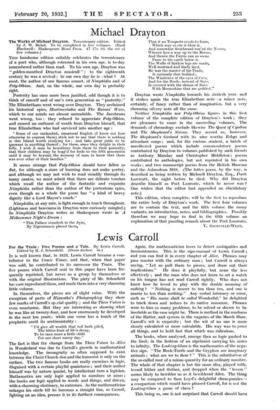Michael Drayton
The Works of Michael Drayton. Tercentenary edition. Edited by J. W. Hebei. To be completed in five volumes. (Basil Blackwell Shakespeare Head Press. £7 17s. 6d. the set of five volumes.) Tars handsome edition suitably celebrates the tercentenary of a poet who, although esteemed in his own age, is to-day remembered rather than read. To his own age, Drayton was " golden-mouthed Drayton musicall " ; to the eighteenth century, he was a revival ; to our own day he is—what ? At most, the author of one famous sonnet, of Nimphidia and of Poly-Olbion. And, on the whole, our own day is probably right.
Posterity has once more been justified, odd though it is to think of oneself and of one's own generation as " posterity." The Elizabethans went wrong over Drayton. They acclaimed his historical epics, Mortimeriados and The Barons' Wars, which to our minds are almost unreadable. The Jacobeans went 'wrong, too : they refused to appreciate Poly-Olbion, and caused an outburst of wrath from Drayton himself, that true Elizabethan who had survived into another age :
" Some of our outlandish, unnatural English (I know not how otherwise to express them) stick not to say that there is nothing in this Island worth studying for ; and take great pride to be
isorariunything thereof ; for th,silcotle tlightinteir lyvitmate .iemt,tpostety that their children may be begg'd for fools to the fifth generation until it may be beyond ,the memory of man to know that there was ever other of their families."
It seems strange that Poly-Olbion should have fallen so flat, for although a store of learning does not make poetry, and although we may not wish to read steadily through its many cantos, we must admit that there are delicate touches which recall the author of the fantastic and exquisite Nimphidia rather than the author of the portentous epics, even though as a whole the poem has " a kind of heavy dignity like a Lord Mayor's coach."
Nimphidia, at any rate, is light enough in touch throughout. (Lightness and heaviness in Drayton were curiously mingled.) In Nimphidia Drayton writes as Shakespeare wrote in A Midsummer Night's Dream :
"This Pallace standeth in the Ayre, By Nigromancie placed there. That it no Tempests needs to team, Which way so ere it blow it.
And somewhat Southward tow'rd the Noon°, Whence lyes a way up to the Moone, And thence the Fayrio can as soono Passe to the earth below it.
The Walls of Spiders legs are made, Well mortized and finely layd, He was the master of his Trade, It curiously that builded ; The Windowes of the eyes of Cats, And for the Roofo, instead of Slats, Is covered with the skinny of Bats, With Moonshine that are guilded."
Drayton wrote Nitnphidia towards his sixtieth year, and it strikes again the true Elizabethan note—a minor note, certainly, of fancy rather than of imagination, but a very charming silvery note all the same.
Neither Nimphidia nor Poly-Olbion figures in this first volume of the complete edition of Drayton's work ; they are pleasures to come in the succeeding volumes. The demands of chronology exclude likewise The Quest of Cynthia and The Shepheard's Sirena. They accord us, however, The Shepheard's Garland with its nine worthy Ectags and attendant songs ; and, for the curious student, a batch of uncollected poems which include commendatory poems contributed by Drayton to volumes published by such friends as Anthony Monday, and Christopher Middleton ; poems contributed to anthologies, but not reprinted in his own works ; and two manuscript poems from the British Museum and the Ashmolean MSS. (The latter poem, by the way, is described as being written by Michael) Drayton, Esq., Poett Lawreatt, the night before he died. Why did Drayton describe himself as Poet Laureate, which he never was One wishes that the editor had Appended an elucidatory note.) This edition, when complete, will be the first to reproduce the entire body of Drayton's work. The first four volumes are to contain the text, and the fifth volume the many variants, an introduction, notes, and bibliographies. Possibly therefore we may hope to find in the fifth volume an explanation of that puzzling remark about the Poet Laureate.
V. SAC VI LLE-WEST.






































 Previous page
Previous page